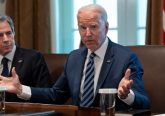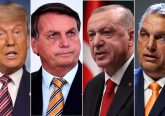One year has passed since Donald Trump’s inauguration as president and his promise to reorient American foreign policy away from a liberal internationalist agenda to putting “America First.” Since January 2017, the Trump administration has jettisoned major diplomatic achievements of the Obama years – the TPP and the Paris Climate Change Accord. Further, he has called for a revision of the Iran Nuclear Deal and NAFTA, escalated the nuclear standoff with North Korea and threatened to disrupt relations with its long-term allies in Europe and Asia.
The main features of the new American foreign policy so far have been:
- A transactionalist, business-style approach to international bargains, with the aim to negotiate or re-negotiate treaties on more favourable grounds for the US;
- A value-free foreign policy, in which relationships are judged based on what they deliver to the US, regardless of common values and shared historical bonds, and, which is reluctant to criticize other country’s human rights records and sceptical about democracy promotion.[1]
- Putting the military at the centre of US strategy, both by appointing military staff to key positions in the administration (McMaster, Mattis, Kelly) and giving the Pentagon even greater influence vis-à-vis a reportedly scaled-back State Department.
These features clearly represent a dramatic U-turn on the Obama years, but they also contrast with the traditionally liberal internationalist outlook of US foreign policy. The question is where did this volte-face come about from? What are the intellectual foundations of Trump’s foreign policy, and what practical steps are derived from it?
To understand the popular appeal of Trump’s militaristic view of foreign affairs, it is instructive to go back to the traditional strands of US foreign policy. The mainstream thinkers of America’s role in the world can be thought of as ‘Hamiltonians’ and ‘Wilsonians’, named after the presidents that famously embodied these ideas. They stress the importance of building a global liberal order with the US at its helm. ‘Jeffersonians’ are more realist in terms of International Relations theory and call or reducing the United States’ global profile to minimize the costs and risks of foreign policy. According to Walter Mead, both of these camps have been challenged in the last decades – and especially so in the 2016 presidential election – by the surge of a ‘Jacksonian,’ or populist, view of world politics.[2] The Jacksonian worldview combines elements of ethno-nationalism, anti-elitism, and strong commitment to the values of the American ‘folk community.’
For Jacksonians, the United States ought to be “vigilant and armed” on the world stage.[3] However, the U.S. should use force only to preserve its vital interests, such as energy supply and geostrategic advantage, but should disregard non-vital issues, such as democracy promotion, regime change or nation building.[4] Jacksonians, like realists, are pessimistic, wary of a “ruthless, formidable enemy abroad with a fifth column in the United States.” McCarthyism was an example of Jacksonian frenzy in the 1950s, and so is today’s fear of migration from specific regions of the world.[5] There can be no progress in international relations and little mutual gains through cooperation. Enemies, abound and will invariably work to undermine American hegemony. Washington must respond to these attempts with resolute military strength and looking out for itself first and foremost.
Liberals, who have dominated American foreign policy thought, have maintained a positive-sum view of world politics: through the impact of free trade, institutions, and the effort of a benign hegemon, the world is becoming more and more prosperous, and everybody – especially the US – is gaining from this endeavour.[6] To a Jacksonian, global affairs will inevitably appear as a competitive game, be it in politics or economics. The gains from trade and resource exploitation will not be distributed equally, and the American people are at high risk to lose out, because of their openness to and overreliance on the global economy. The main losers are lower-middle-class American workers, who have seen manufacturing being outsourced and competition increase. To them, the enemy of the United States is both inside and outside the country.
Such a Jacksonian mind-set fits with Trump’s approach to global politics. The administration’s “America First” rhetoric presents the government as the defender of the American people against foes who want to take advantage of its purported weakness, or partners who want to free-ride on US generosity and security guarantees. Military assertiveness and readiness for confrontation are essential for the US, not to act as the global policeman, but the defender of its immediate interests. Trump emphasizes the need to restore US military power after years of declining budgets. The new administration is a staunch critic of Obama’s strategy of relying on diplomatic accords and economic engagement. According to Trump’s foreign policy advisors, this policy weakened US forces and its deterrent credibility, while strengthening opponents.[7]. Former advisor to the Trump campaign and now director of the National Trade Council Peter Navarro strongly supports a quasi-mercantilist view of the world, and has identified in China the main adversary.[8] The rejection of free-trade global engagement fits well with the Jacksonians’ distrust of elites’ liberal foreign policy.
Foreign policy, of course, also serves domestic purposes.[9] In Trump’s case, it is even more evident: the new administration seems to pay strong attention to its domestic audience. That is one of the reasons why Trump employs a tough and colourful rhetoric where other presidents adopted diplomatic language, as it shows his domestic audience that the government is embarking on a programme of defending US interests in a hostile world. Trump promised to look out for his constituents, by, for instance, renegotiating “bad trade deals” and to reducing spending to the UN and foreign aid. Some decisions over the past twelve months like quitting international agreements, banning immigrants from specific religious-national groups and employing harsh rhetoric against allies are rightly regarded as diplomatic blows to the American image in the world. But they can be traced back to the administration’s need to show their base that they are fulfilling the task for which they have been elected: to restore the American position in the world.
The logic behind Trump’s strategy appears to be grounded in a Jacksonian view of foreign affairs which resonates with the American public. The belligerent and headline-grabbing rhetoric of the commander-in-chief and his propensity to choose short-term, tactical wins over the incremental execution of the long-term priorities often overshadow the more or less solid intellectual foundations of Trump’s foreign policy. While it is important to consider the most theatrical elements of Trump and discuss the damaging effects they may have for international peace and cooperation, we should not overlook the ideological background and the grand strategy that informs the administration’s actions.
[1] Grevi, Giovanni, “Lost in Transition? US Foreign Policy from Obama to Trump”, European Policy Centre. http://aei.pitt.edu/82224/1/pub_7240_lostintransition.pdf.
[2] Mead, Walter R., “The Jacksonian Revolt.” Foreign Affairs, Vol. 96, No. 2, March/April 2017.
[3] Mead, Walter R., “The Jacksonian Tradition and American Foreign Policy.” The National Interest, Vol. 58, Winter 1999.
[4] Mearsheimer, John J., and Stephen M. Walt, “The Case for Offshore Balancing. A Superior U.S. Grand Strategy.” Foreign Affairs, Vol. 95, N. 4, July/August 2016. https://www.foreignaffairs.com/articles/united-states/2016-06-13/case-offshore-balancing
[5] Mead, “The Jacksonian Tradition and American Foreign policy”, p. 21.
[6] Ikenberry, John, After Victory: Institutions, Strategic Restraint, and the Rebuilding of Order after Major Wars (Princeton: Princeton University Press, 2009).
[7] Gray, Alexander and Peter Navarro, “Donald Trump’s Peace through Strength: Vision for the Asia Pacific,” Foreign Policy, 7 November 2016. http://foreignpolicy.com/2016/11/07/donald-trumps-peace-through-strength-vision-for-the-asia-pacific/
[8] Navarro, Peter, Death by China (Prentice Hall, 2011).
[9] Putnam, Robert, “Diplomacy and Domestic Politics: The Logic of the Two-Level Games”, International Organization, Vol. 42, No. 3 (Summer 1988), pp. 427-460.






